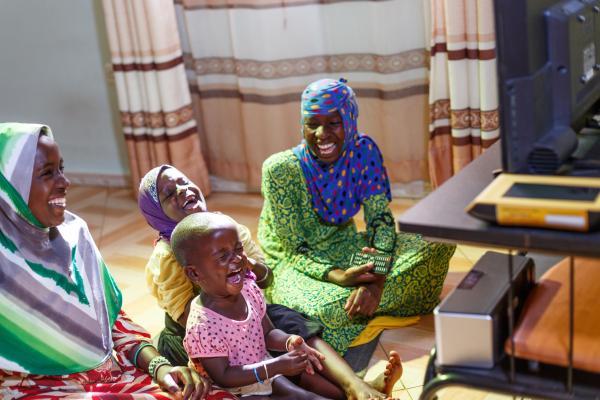
- New analysis identifies challenges and solutions to transform clean energy
- In-depth research in Nigeria, Uganda and Rwanda provides framework for continent
- Study provides specific policy guidance for African countries based on barriers
- EIB confirms financial and technical support for off-grid to transforming energy access for 120 million African households lacking electricity
The European Investment Bank and the International Solar Alliance today published a new study outlining solutions to overcome key affordability and investment challenges holding back off-grid solar investment across Africa.
“Increased use of off-grid solar technology across Africa is essential to harness clean and affordable energy and transform the lives of millions of people. The new European Investment Bank and International Solar Alliance study published today combines experience and expertise from successful off-grid deployment to outline how investment can be unlocked to increase access to solar power. The ground-breaking analysis demonstrates how closer cooperation between African, European and global partners can unlock investment and technical barriers that hold back sustainable development and the green transition.” said Ambroise Fayolle, European Investment Bank Vice President.
“The joint International Solar Alliance – European Investment Bank study outlines a pathway to unlock access to off-grid solar in Africa. This builds on proven success, expert insight and commercial experience to identify and overcome investment gaps and financial barriers holding back off-grid solar. The study details what can be done to increase access to clean energy to off-grid rural areas including refugee camps, urban areas and remote villages across Africa.” said Dr Ajay Mathur, Director General of the International Solar Alliance.
Unblocking off-grid energy investment to enable a better future for millions
At present more than 120 million households across Africa lack access to reliable and affordable energy, with 60 million households expected to remain without electricity by 2030 unless urgent action is taken.
The new in-depth overview of recent private sector led deployment of small-scale solar energy systems across sub-Saharan Africa identifies five key challenges that can be addressed to unlock high-impact local energy investment essential for sustainable development and economic growth on the continent.
The study, based on detailed consultations in Uganda, Rwanda and Nigeria and analysis of off-grid markets across the region, provides recommendations for effective intervention to scale up off-grid solar deployment depending on specific local issues.
Sharing best-practice that allows investment and technical barriers holding back off-grid solar is key crucial to scale up off-grid solar, allow vulnerable and remote communities to access clean energy and deliver the sustainable development goal of universal access to reliable and affordable energy.
New study provide technical and business solutions to scale up off-grid solar across Africa
Commissioned by the European Investment Bank, in partnership with the International Solar Alliance, and compiled by development advisors Dalberg, the new study gathers local technical and financial experience and insight from successful deployment of off-grid solar investment in Africa.
This includes examining how off-grid solar investment has benefits refugee communities in Uganda and enabled cost-effective energy access in Nigerian cities.
Sharing best-practice with development finance partners
Investment challenges including affordability, working capital and exchange rate risks and political and economic stability holding back private sector investment in off-grid solar can be reduced through combining commercial financing and support form development finance partners.
The key recommendations of the study outline different models of intervention to overcome financing, technical and customer challenges to scale up off-grid solar deployment were highlighted ahead of final publication in specialist workshops attended by representatives of AfD, KfW, FMO and the European Commission.
Breaking down barriers to scaling up off-grid solar
The report published today examines off-grid solar investment across Africa and assesses how investment barriers including affordability, equipment supply, access to working capital, regulatory challenges, insurance and technical expertise influence and hinder deployment.
The analysis uses solutions developed in local case studies to suggest how examples such as aggregated purchase of solar home systems can reduce costs and rapidly enable low-income, urban and rural communities and refugees to access reliable energy through sustainable private sector led off-grid solar projects.
The study, based on the analysis by specialised development consulting firm Dalberg, was compiled following in-depth research on government policy, on discussions with energy, business and development finance stakeholders across Africa and stakeholder workshops in Nigeria, Uganda and Rwanda.
The European Investment Bank is supporting 8 off-grid solar projects across Sub-Saharan Africa.
Last year the EIB provided EUR 5 million for private and public investment across Africa and is supporting off-grid solar across Africa including projects in, Chad, Comores, Gambia, Kenya, Mozambique and Uganda.
Commercial and Economic Feasibility Study for Enhancing Off-Grid Solar Inclusion in Sub-Saharan Africa report
Background information
The International Solar Alliance is undertaking joint efforts to reduce financing costs and the cost of solar technology applications and services. The ISA seeks to help countries mobilize $1 trillion of investment for a massive deployment of solar energy technologies and expand solar markets. This would help achieve three different but interlinked objectives: promoting a clean energy transition, enabling energy access and energy security, and delivering a new economic driver for all countries.



